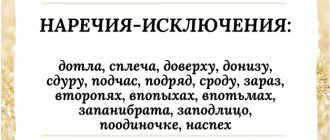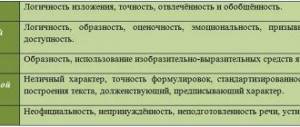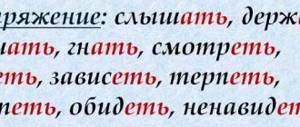Summary of the search lesson in 7th grade “Spelling not with participles” (with presentation)
Lesson - search.The purpose of the lesson: to repeat the spelling not with different parts of speech, to show the conditions for choosing this spelling in participles. Objectives: 1. identify types of spellings associated with continuous and separate spelling not with words of other parts of speech, show the conditions for choosing this spelling in participles, study theoretical material on the topic. 2. promote the development of observation, the ability to analyze, compare, draw conclusions, develop the ability to work with tests, with a textbook, with a dictionary entry, tables, and develop students’ oral and written speech. 3. encourage students to self- and mutual control, to be demanding of themselves, to form moral ideas about the value of competent writing, through A.S. Pushkin’s article to form ideas about a person’s responsibility for his actions. Methods: observation, data analysis, tabular method, comparative method, partially search method.
1.Introduction. Teacher's words. The holidays are over - what a pity! All that remains of them is a memory. And today I ask you, guys, to tune in seriously to the lesson and not to make noise, as they once did, not to wait for the bell to ring. We will not waste time in vain... We will repeat the sacraments. Guys, today we will be treasure hunters. And you guys shouldn't just be spectators. In order to successfully move along the proposed route and find the treasure, you must strictly observe one condition - correctly complete the tasks that occur along the way. The purpose of our lesson is to repeat basic and new spellings in the “Communion” section and prepare for testing. We take with us everything we need: - route sheets, - pen, - pencil, - notebook, - textbook, - and, of course, a supply of knowledge. And I will be your commander. Before we start looking for the treasure, let's listen to the girls who visited a fairyland during the holidays and want to share their impressions. Girls: -We want to tell you about our journey through S. Bondarenko’s poem:
I once visited a country where a particle disappeared. I looked around with bewilderment: What kind of awkward position is this?
But it was quiet all around, And there was confusion in everything. And in the bright flowerbed near the Blue booth, forget-me-nots bloomed.
And the weather was fine, And the happy dog was walking, And, wagging its tail, it clumsily ran through the crawling puddles.
A washed, combed grouse walked towards me without any fear, and behind the grouse on the fresh grass walked a stern, warm and cool man.
And from the school, holding hands, the daughters walked out with a sedate step. And Princess Smeyana smiled to meet everyone early in the morning.
It's a pity that only in a dream there is a country without a particle.
Thank you for your performance. How not to envy the inhabitants of the fictional country from the poem, with the disappearance of NOT they got rid of a difficult spelling problem! Look carefully and name the parts of speech heard without not, using them with not. Read the words that describe a face. Name a word similar to the word ignoramus. Work ignorant - ill-mannered, ignorant - uneducated (previously the meanings of the words were the same, since the 19th century they began to differ in V. Dahl's dictionary). Such words are called paronyms (slightly similar in meaning and sound). Let's try not to be ignorant and ignorant, learn and be responsible for our actions. A.S. Pushkin also taught this in his journalistic article “For the edification of posterity.” Why is it called journalistic? What is edification? (Do not) show helpfulness and curb your heartfelt disposition if it takes possession of you: people are (not) puzzled by this and willingly mistake it for ugliness, for they are always happy to judge others by themselves. Never (not) accept favors. A favor is most often (not) devotion, but betrayal. Avoid patronage, because it enslaves and humiliates. Never (never) respond to an insult with an insult. Never (never) get into debt. Better endure the need; believe me. It is better than the (inevitability) of suddenly being dishonest or being known as such. The rules that I offer you were acquired at the cost of (difficult) life situations that I have experienced. It would be good if you could learn them, (in)sophisticated descendant. Teacher: - Did you like the advice of A.S. Pushkin? What advice would you take for yourself? The students answer. (Do not make debts, do not respond with insults, do not show helpfulness, etc.) Pushkin also uses NOT. For what purpose does he use it? Psychologists say that the particle is NOT poorly absorbed, especially by children. If the teacher says “Don’t forget to learn the rule,” then, according to psychologists, the particle is NOT perceived and the student will definitely forget to learn the rule. It’s better to say: “Learn the rule.” In which sentences of the text did Pushkin write the correct advice without a negative particle? How does he achieve this? What verb form did Pushkin choose and why? How did you determine this? Avoid (analysis of the word by composition at the board) In fact, edification is given by the older generation with the goal of making their descendants wise and decent. Perhaps you should listen to the advice of the older generation. Teacher: — What rule are associated with the words that are underlined below? The students answer. (Not with verbs, nouns, adjectives) Teacher: - Explain the choice of continuous and separate spelling. The students answer. (Not with adverbs, with adjectives, nouns, participles) Students repeat the well-known rules. Working with words and explaining the choice of continuous or separate spelling (inexperienced - from tempt, root kus, try, hence the concept of a skilled master) How did you determine that this is a participle?
Teacher: Take route sheet No. 1. Look at the table and draw a conclusion: what condition is common to all parts of speech. For nouns with adjectives?
Verb Together Separately Without not not used Always (except for exceptions)
Noun Together Separately BBez not not used There is a contrast with the conjunction a You can choose a synonym without not
Adjective Together Separately Without not not used There is a contrast with the conjunction a You can choose a synonym without not There is a dependent word AT ALL, FAR, NOTHING, NOTHING, NOT ONE, NOBODY
The particle is NOT used with nouns, adjectives, pronouns, numerals, verbs, participles, gerunds. When writing particles not with parts of speech, there is a certain rule. But one rule remains the same for everyone. Who can name him? (If the word without NOT is not used) -Which word are you not sure of the spelling? Why? Students: participle inexperienced. How is it written and why? Here are spelling options that do not include this participle. What determines the choice of spelling? Communion Together Separately Inexperienced descendant. There is no dependent word, opposition with the conjunction a. A descendant not seasoned by time. There is a dependent word: Hating, indignant. Without not not used Not a sophisticated, but a descendant beginning to understand. There is a contrast with the conjunction a. Not sophisticated. Short communion. Teacher: -Hypothesis of the rule. What is the topic of our lesson? Students formulate a topic. Write down the topic of the lesson. Reading the rule, inferring familiar choice conditions. Write examples from the slide into the table. From exercise 137 we find examples for the remaining columns. We designate spellings. There are 5 people at the board.
Physical exercise (we stood up, raised our arms up, stretched, bent over, squatted, stood up, stretched our backs, bent our heads, shook our arms, so we rested).
There is still a short way to the treasure. There is one task left and we will get to what we have been striving for since the beginning of the lesson. Our task is to solve a crossword puzzle. Definitions for each word are provided. We solved the crossword puzzle. Now the solemn moment has arrived. Before us is a treasure. But a key is required. The key to the chest is to compose the missing fragments in the fairy tale. What sentences are omitted from the story?
In the Grammar Kingdom, in the Morphological State, in the city of Parts of Speech, in the house of Particles, there lived the particle He. She felt very lonely. She decided to go look for friends. She was walking along the road, and now Short Communion comes towards her. -I want to be friends with you! I want to be with you forever! But... The saddened woman did NOT wander further in search of her friend. He sees that a very Full participle with a dependent word is trailing towards him, and behind it the same participle with opposition and conjunction a. Seeing NOT, they... NOT completely lost hope, but suddenly she saw: a beautiful Full Communion was rushing straight towards her with all its might and shouting loudly: -You are my beloved! You are my good one! I'm looking for you everywhere! I can not live without you! They hugged and immediately became inseparable. And then they met a lonely Communion. It said: -I have neither dependent words nor opposition with the conjunction a. I am a lonely Communion, be friends with me. To which the particle NOT answered her with full communion... And the friends ran towards adventure. The chest opens, but what is in it? It usually contains jewelry. In our chest there are pieces of paper with an algorithm for reasoning about spelling NOT with participles. Why do you think they were in the chest and will they be useful to you? Place them in your notebook with supporting notes. Please look, have we talked about everything that is in the algorithm? Homework: come up with an edification for future seventh graders, using an algorithm and advice from a psychologist. Now, having the algorithm, please solve the assessment test.
Test https://www.saharina.ru/tests/test.php?name=test252.xml
1. Indicate the answer option in which NOT is written separately with the word. 1) (not) a hateful gaze 2) (not) an indignant person 3) (not) read a book 4) (not) started an essay 2. Indicate the answer option in which NOT is written separately with the word. 1) (irreconcilable contradictions 2) (un)questioning look 3) (un)visible spaces 4) unbroken silence 3. Indicate the answer option in which NOT is written separately with the word. 1) (un)noticeable error 2) (un)solved problem 3) (in)dependent person 4) (in)declinable nouns 4. Indicate the answer option in which NOT is written separately with the word. 1) (un)solved, but written off problem 2) (un)combed child 3) (un)washed face 4) (un)learned rules 5. Indicate the answer option in which NOT is written separately with the word. 1) (under)underestimated act 2) (un)seeded field 3) (un)expected meeting 4) (not)cooled down from the heat 6. Indicate the answer option in which NOT is written together with the word. 1) flowers (not yet) blooming 2) film (not) watched 3) theorem (not) proven 4) (not) waterproof raincoat
Key. 1. 3. 2. 4. 3. 1. 4. 1. 5. 4. 6. 4.
Evaluating answers and work in class. 1-2 errors - 4, 3-4 errors - 3, 5 or more - 2.
Conclusion. Did you achieve the lesson objectives?
Reflection If you agree with the statement, then clap your hands. -I learned the material on spelling particles NOT with participles -I didn’t understand the topic of today’s lesson very well -I’m happy with the grade for the test Now clap if you liked the lesson. And now I ask my assistants to hand out gifts in gratitude for the fact that you agreed to watch our lesson and rejoice at the children’s success. Thanks for the work. Goodbye.
References.
1. Baranov M.T., Ladyzhenskaya T.A., Trostentsova L.A. and others. Russian language. 7th grade/Scientific editor acad. RAO N.M. Shansky. M. Enlightenment. 2007
Internet resources used.
- Educational website of the teacher of Russian language and literature Elena Alekseevna Zakharyina. Interactive technologies in education https://www.saharina.ru/tests/test.php?name=test90.xml
- Social network of educators. https://nsportal.ru/shkola/russkii-yazyk/library/otkrytyy-urok-7-klass-po-teme-pravopisanie-ne-s-prichastiyami
- Stihi.ru https://www.stihi.ru/2013/09/03/3967
- Crossword Factory. https://puzzlecup.com/crosswordru/?guess=B9C9072AC24AB6AU
Download material
so UNT / Lesson plans for the Russian language / Lesson plans for the Russian language 7th grade
Lesson 47. Practical work “Conjoint and separate writing not with participles”
14.12.2011 20954 2408
Lesson 47. Practical work “Conjoint
and separate writing
not with participles”
Target:
consolidate writing skills not with participles, punctuation skills, independent work skills.
Methodical techniques:
practical work, linguistic analysis, vocabulary work.
During the classes
I. Linguistic warm-up
Word formation analysis and analysis of words by composition: Unawakened -
the word is formed by a prefix. Word formation series:
unawakened
<—
awakened
<—
wake up *— sleep.
The word
wake up
is formed in the prefix-suffixal
\
way, and only the consonant
s remains from the root.
II. Checking homework
1. Report on cases of combined and separate writing not with participles.
2. Exercise 134: one student performs a morphological analysis at the board (completed),
at this time the exercise is checked
"along the chain"
I III. Explanatory dictation
1)
I never tired of telling my friends about everything: about the river, about fishing at dawn, about the unprecedented size of the porcini mushroom that I found under a small spruce tree.
2) An unrenovated apartment looks untidy.
3) This wallpaper is not dry, but still wet.
4) I was struck by his perplexed look, cast from under his brows.
5) It was impossible to eat completely undercooked meat.
6) The necessary arguments were never found.
7) The book, which had not yet been read, lay on the windowsill for some time now .
I share.
IV. Doing exercises
1. Exercise 136: expressive reading, conversation on questions, I independent writing.
A comment.
The style of the text is artistic, the main idea is that man is helpless in front of nature, which has extraordinary power.
2. Exercise 137: oral analysis, written execution. A comment.
The word
incorrect
from the first group is necessary
move to the second group (it can be used without not).
Sentence from the fourth group: The phone has not yet been repaired —
should be transferred to the third group.
V. Vocabulary work
Write down the words in the box on p. 67, in the dictionary of synonyms; define words as parts of speech, find the general meaning of words. Make out the word sinister
by composition.
Terrible, terrifying, terrifying, terrible, monstrous, creepy, ominous, formidable.
Homework
1.§24.
2. Exercise 138.
See the downloadable file for the full text of the material.
The page contains only a fragment of the material.






